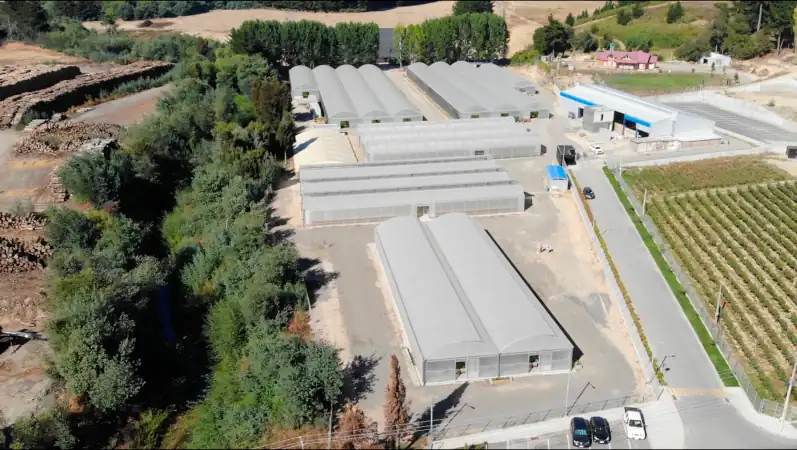Coelemu, a word from the Mapudungun "koa lemu," meaning "Forest of Owls," is a commune in the Itata Province of the Ñuble Region. Its main local activities are traditional wine production and the forestry industry, reflected in the fact that 63.98% of its territory is covered by plantations for this sector.
This is where Forestal León is located, led today by industrial civil engineer Antonio Viñuela, who has dedicated his life to building this company. Its origins date back to 1957 when his father, Celso Viñuela García, just 24 years old, arrived in Chile from the province of León, Spain.
In his early years, his father worked as an employee before turning to commerce. Then, in 1973, he purchased a lumberyard in San Bernardo, Santiago, marking the beginning of what would become Comercial Viñuela S.A. There, in a way, the entrepreneur Antonio Viñuela was shaped, learning the timber business as a child.
In 1991, Antonio Viñuela, along with his father and brother, decided to buy their first forest in August and hired a mountain sawmill to begin operations. Though they didn’t profit at first, they went on to acquire a second, third, and fourth forest. "Everyone told me to quit the business, but no company gave me the chance to do my thesis, forcing me to go solo and self-taught. I spent two years losing time and money until I acquired a forest in Rafael, near Tomé. It was my last chance, but the forest gave me more than I expected," he recalled.
In 1993, due to harsh weather, several bridges were cut off in the Temuco and Santiago areas, leaving no timber available—except for Antonio’s. This allowed him to take a leap forward and repay all his family’s loans. "From then on, I never lost money again. Until 1999, I worked itinerantly with mountain sawmills across the country, but I focused on burned forests—if processed quickly, the wood can be fully utilized," he remembered.
He traveled across Chile with this business model but knew it wasn’t sustainable long-term, especially due to increasing legal requirements for worker safety and labor regulations. That’s why, in 2000, he settled in Vegas del Itata, Coelemu, where a plant had been idle since 1975. He revived the place by establishing a permanent sawmill and began refining his processes.
In 2001, an executive from Sodimac took notice of the wood he produced. They began supplying products to the retailer, a pivotal move—what started as one truckload per week grew to over 15 daily. "We became essential to this retail chain because we were good, affordable, and reliable. Today, we account for 35% of their supply, and no one can replace us. In essence, we depend on each other," he emphasized.
He has also worked with Arauco, exported to Japan, supplied Cementos Biobío for shipments to the Middle East, and partnered with firms focused on green timber markets. But the biggest leap was undoubtedly with Sodimac. Today, they produce green, dried, treated, laminated wood, and plywood panels, meeting high-quality standards and adding value. Their products are available in all Sodimac stores in Chile and Colombia, as well as other clients in Central America and the Caribbean.
Advice for the industry
But that’s not all. Antonio stressed, "One of the keys to the company—and what has allowed me to operate as Forestal León—is that I’ve never relied on third-party suppliers. I’ve always bought forests directly, from my nomadic days in 1991 until settling in Coelemu in 1999. Today, I own 12,000 hectares, and we’ve consistently purchased mature standing forests from private owners, investment funds, and even major forestry companies like Masisa, Arauco, and CMPC."
By 2013, he had enough forests to supply his industry for five years; today, it’s three. "So, if I can give advice to the sector, it’s this: never depend on incoming logs—own your own forests. That gives you time, margin, and independence to work," he highlighted.
Antonio believes in adaptability and maintaining strong customer connections while ensuring efficiency at all times.
Thus, one of the company’s main goals is to add value to its wood products while maintaining a holistic vision of resource management, creating value for its surroundings, and improving the quality of life for its employees. What began as a family dream in those distant years in San Bernardo has now taken shape.
To achieve this, Antonio relies on 440 direct employees at Forestal León, accounting for 40% of Coelemu’s employment. "I have people who’ve been with me for 31 years, starting by my side. Some employees have even brought their children, siblings, and grandchildren to work at the plant," he noted.
Additionally, 500 to 600 indirect jobs are created for the commune—a significant impact for a locality in a region that’s only five years old.
"Today, I dare say we’re an industrial complex. We start with a seed plant that collects seeds from our forests, producing high-quality pine trees, all the way to final harvest—transforming forests into dried, treated, laminated wood, and all kinds of panels. In between, we use all forest waste to produce steam for our processes and generate electricity to self-supply the plant, even selling excess power to the grid for nearby communes," he explained.







Comments (0)
No comments yet. Be the first to comment!
Leave a comment